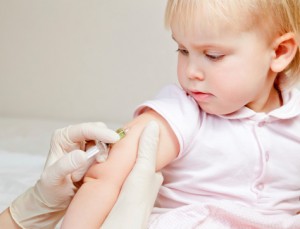August is National Immunization Awareness Month
 With the kids headed back to school soon, August is a popular month for parents to make appointments for back-to-school doctors’ visits. August is also National Immunization Awareness Month, so it’s a great time to talk to your child’s doctor about any vaccines that he may need this year. The recommendations change fairly frequently as new vaccinations are added to the list, so don’t promise your kids that they won’t get shots at this year’s visit, just in case!
With the kids headed back to school soon, August is a popular month for parents to make appointments for back-to-school doctors’ visits. August is also National Immunization Awareness Month, so it’s a great time to talk to your child’s doctor about any vaccines that he may need this year. The recommendations change fairly frequently as new vaccinations are added to the list, so don’t promise your kids that they won’t get shots at this year’s visit, just in case!
Here are a few recommendations that you might not have been aware of:
- Your pre-teen or teenager might need immunizations. After the shots that they receive before kindergarten, kids usually have several years where they don’t get any. If your child is between the ages of 9 and 18, though, he or she might be due for one or more vaccines. Your doctor might recommend the human papillomavirus vaccine for boys and girls age 9 and up. Your pre-teen might also be due for a tetanus booster; now kids usually get the Tdap, which has a pertussis component, since the pertussis vaccines given during early childhood may be waning by now. Finally, most 11- and 12-year-olds should get the meningococcal vaccine. If your child is behind in any childhood vaccinations, such as the MMR (measles, mumps and rubella) or the chicken pox vaccine, these might also be given at this time.
- Your child might need a flu shot. The Centers for Disease Control and Prevention recommends that nearly everyone over the age of 6 months get a flu shot each year. This is given in the fall or winter, not in August, so you may need to make an appointment to come back in a few months.
- Your baby might need vaccines that are not on the routine schedule. If he was born prematurely, for example, he may need an immunization to prevent RSV, a potentially serious virus that affects the respiratory system.
- Your child might not be able to receive certain vaccinations. If he’s had a serious reaction to a vaccine in the past, his doctor might recommend that he receive no more doses of that particular vaccine or component. If your child has any allergies, be sure that his doctor knows before giving him vaccines; some vaccinations contain potential allergens.
Remember that although vaccines can cause a low-grade fever, soreness, fussiness and other short-term, treatable symptoms, the diseases that they prevent are much worse. Also, by protecting your child against communicable diseases, you’re also protecting others in the community, including young babies who haven’t received any vaccinations yet and those with conditions making it impossible for them to receive certain immunizations.
If you have any questions about immunizations or concerns about vaccine safety, you should discuss these with your child’s doctor. Also, in the unlikely event that your child has a serious reaction to any vaccination, you should report it to his doctor and also to the Vaccine Adverse Effects Reporting System, or VAERS. This system is in place to make vaccinations as safe as possible for everyone.








